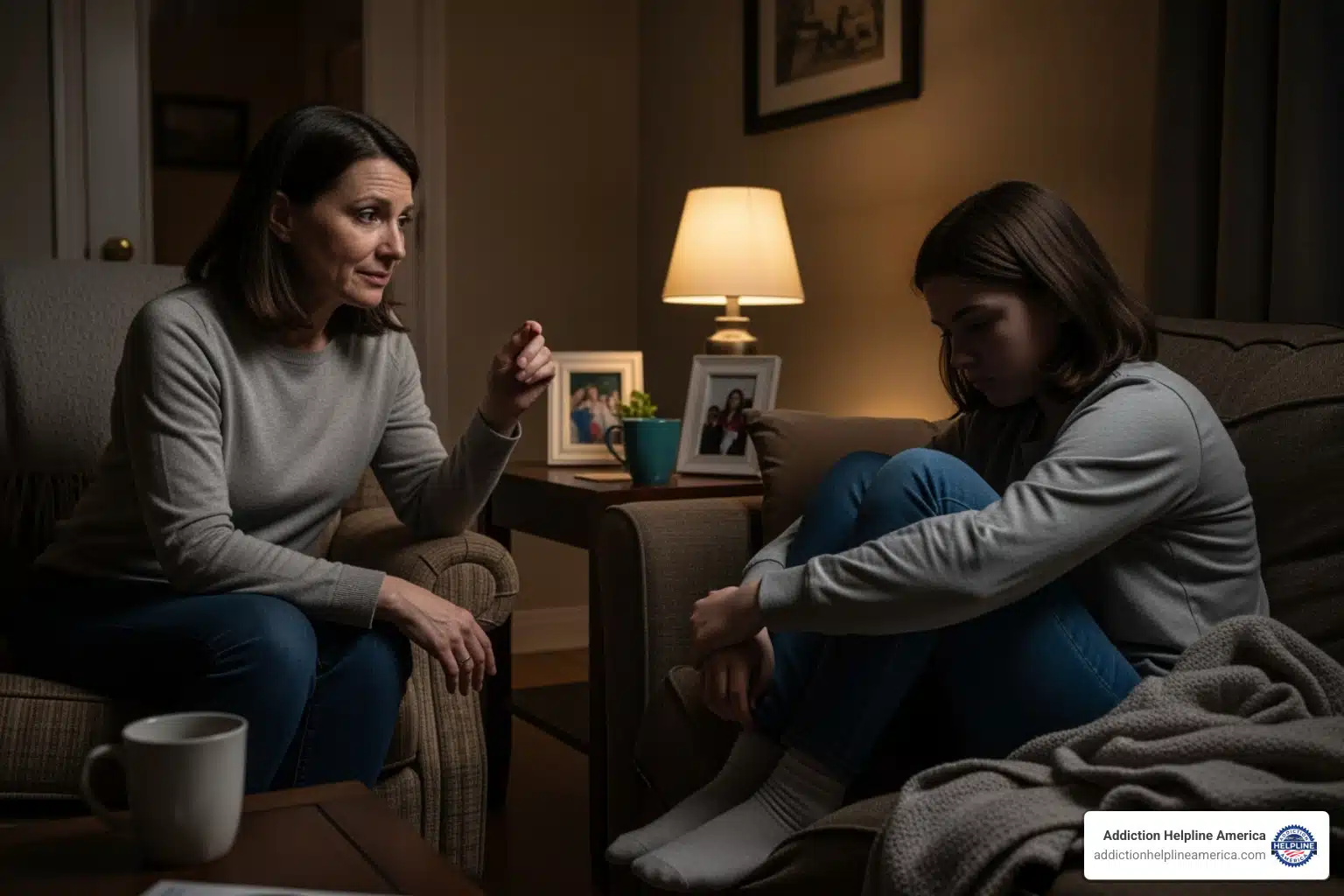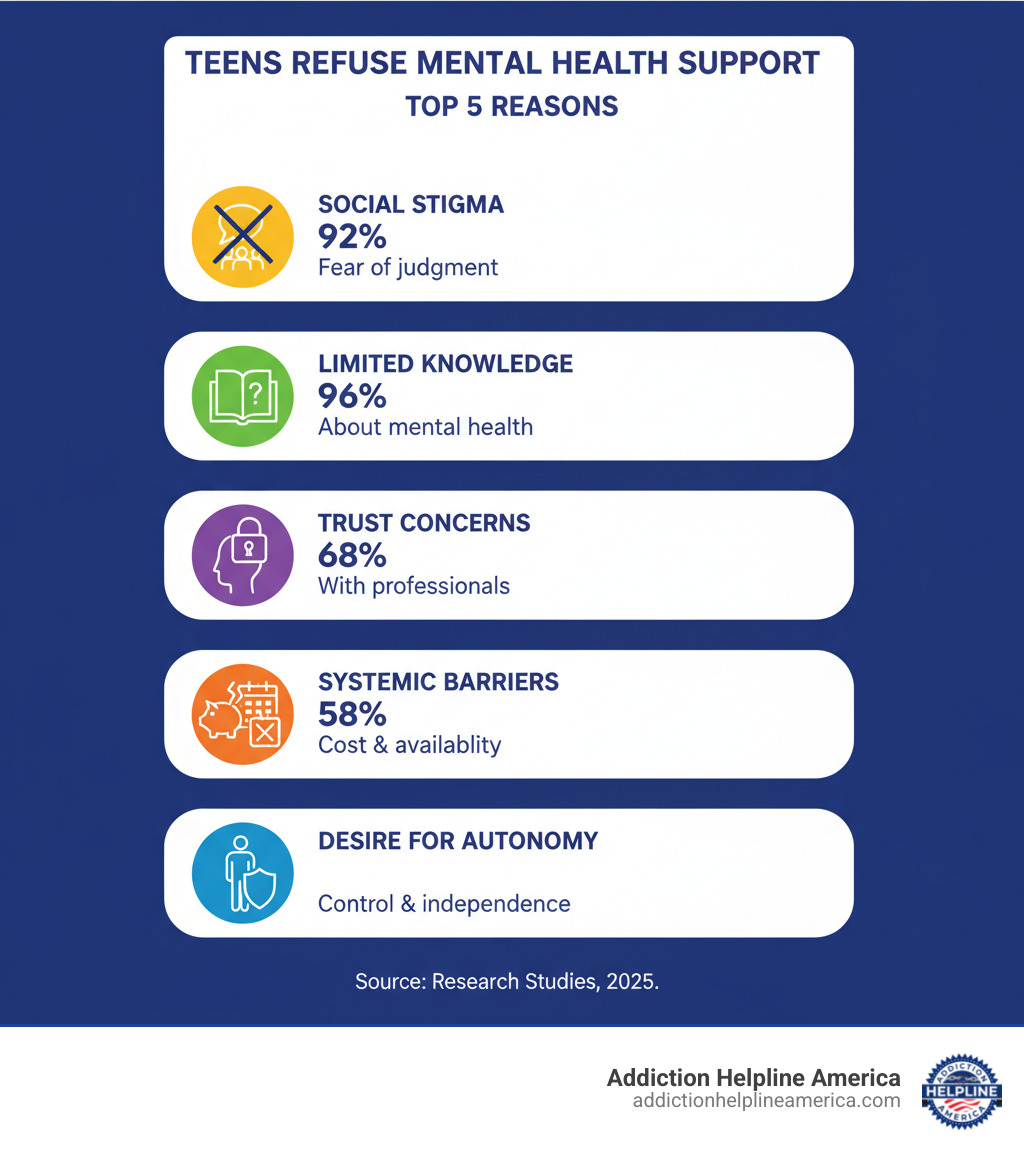
Why Teen Mental Health Resistance Is More Common Than You Think
Can a teenager refuse mental health treatment? The answer depends on your state’s laws, your teen’s age, and the severity of their situation. While parents generally have the legal right to consent to treatment for minors, the reality is more complex:
Legal Rights Summary:
- Ages 12-18: Consent laws vary by state; some allow teens to refuse outpatient mental health services
- Emergency situations: Teen refusal can be overridden if they pose danger to themselves or others
- Parental authority: Generally applies, but forced treatment is often ineffective
- “Mature minor” doctrine: Some states recognize sufficiently mature teens’ right to make medical decisions
Recent research shows that 96% of studies identify limited mental health knowledge and negative views as primary barriers to teens seeking help. Additionally, 92% of studies highlight social stigma and embarrassment as major factors in treatment refusal.
The frustration is real when you know your teenager needs help but they refuse to accept it. Whether they’re struggling with depression, anxiety, substance use, or other mental health challenges, their resistance can leave you feeling helpless and scared.
At Addiction Helpline America, we’ve guided thousands of families through the complex question of can a teenager refuse mental health treatment and helped parents find effective approaches when teens resist getting help. Our experienced team understands that navigating teen mental health refusal requires both legal knowledge and practical strategies that actually work.
Why Teens Refuse Mental Health Support: Common Reasons and Underlying Fears
If your teen is pushing back against mental health support, you’re not alone. Their resistance usually isn’t about defiance; it’s rooted in real fears that make sense from their perspective. Adolescence is a complex time of seeking independence, and for a teen struggling with their mental health, accepting help can feel like admitting defeat or losing control.
The biggest reason teens avoid support is stigma and embarrassment. Research shows 92% of studies identify social stigma as a major barrier. Teens worry about being labeled “crazy” or “broken” by peers and even family. From their perspective, high school is a fishbowl, and the fear of being known as “the kid who sees a therapist” is so strong that many would rather suffer in silence.
Limited knowledge about mental health is another barrier, cited in 96% of studies. Your teen might believe therapy is just “talking about feelings” with no real benefit, or that their struggles are permanent. When teens don’t see mental health challenges as treatable conditions, their refusal is driven by misconceptions, not just legal rights.
The desire for autonomy and control is also a major factor. Being told they “need” therapy can feel like another adult mandate in their fight for independence—something imposed on them rather than a personal choice.
Trust and confidentiality concerns worry about 68% of teens. They’re terrified their private thoughts will get back to you, their parents, and become ammunition in future arguments.
Some teens deal with denial or hopelessness. They might minimize their struggles (“everyone feels this way”) or feel so hopeless that seeking help seems pointless.
Addressing Their Core Concerns
The key is active listening without judgment. Ask questions like, “What worries you most about talking to someone?” instead of explaining why they need help.
Validating their feelings shows you understand their concerns, even if you don’t agree with their refusal. You might say, “I understand you’re worried about privacy.”
Explaining confidentiality clearly can ease one of their biggest fears. Let them know therapists only share information in specific safety situations and that sessions are private.
Try separating the person from the problem. Instead of saying “you have depression,” focus on symptoms rather than labels, like trouble sleeping or feeling overwhelmed.
Building trust is essential. Follow through on promises and show them that seeking help is about support, not control.
The Role of Stigma and Misinformation
Social pressure and misconceptions from media often portray therapy inaccurately. Your teen may worry that a mental health diagnosis will affect college applications or how adults see them.
Lack of mental health literacy means many teens don’t realize how common and treatable these challenges are. Peer influence can also be a powerful factor, for better or worse.
You can help by normalizing mental health conversations at home. Talk about public figures who have been open about their journeys, like Michael Phelps or Selena Gomez. Show your teen that getting help is a sign of strength.
Understanding your teen’s resistance is the first step. At Addiction Helpline America, we’ve helped thousands of parents steer these conversations and find the right support.
Can a Teenager Refuse Mental Health Treatment? A Parent’s Guide to the Law
Asking “can a teenager refuse mental health treatment” means navigating a legal maze that balances parental rights with your teen’s growing autonomy. It’s one of the most confusing parts of parenting a struggling adolescent.
As a parent, you have a legal duty of care for your child’s physical and mental well-being. This generally gives you the right to make medical decisions for them, including for mental health treatment. However, state laws vary significantly. While you can usually consent to treatment, some states also require the teen’s consent, especially for certain services or at a specific age.
The reality is that even with the legal right to consent, forcing therapy rarely works. Most therapists won’t treat a teen who refuses to participate without a court order. When your teen’s condition becomes severe enough that they might harm themselves or others, the legal landscape shifts. In these critical situations, parental authority and state intervention prioritize your child’s safety over their right to refuse treatment.
Understanding the ‘Mature Minor’ Doctrine and Consent Laws
The age of consent for treatment varies by state. Some states allow minors as young as 12 to consent to certain outpatient mental health services without parental involvement, while others set the age at 16 or 18. There’s also a distinction between outpatient and inpatient consent; your teen might have the right to agree to weekly therapy but not to residential treatment.
The “mature minor” doctrine is a legal concept recognizing that some teens are mature enough to make their own informed medical decisions. Courts assess whether the teen understands the treatment, its consequences, and can explain their reasoning rationally.
For example, in Wisconsin, minors aged 14 or older can petition for a mental health review if their parents refuse to consent to treatment they want. This shows that the question of can a teenager refuse mental health treatment doesn’t have a simple yes or no answer. The doctrine’s key is assessing a teen’s capacity to decide—do they truly understand their choice?
When a Teen’s Refusal Can Be Overridden
There are serious situations where a teen’s refusal of treatment can and should be legally overridden to protect them.
Imminent danger to self or others is the clearest case. If your teen is actively suicidal, threatening violence, or engaging in severe self-harm, their safety takes priority over their autonomy. In these emergencies, involuntary intervention is necessary. This could mean calling 911 or taking your teen to an emergency room, where they can be placed on an involuntary hold for safety. Many states have civil commitment laws that allow this through court orders.
Severe disability or psychosis that impairs rational thought is another situation where refusal may be overridden. The focus shifts to protecting your child until their thinking clears.
Most therapists won’t work with an unwilling teen unless treatment is court-ordered. However, all mental health professionals have an ethical duty to protect children in danger, which can override consent issues in a crisis.
As a parent, you could face legal consequences for medical neglect if your teen’s refusal of essential treatment leads to significant harm and you haven’t taken reasonable steps to help them. In extreme cases, child protective services may intervene.
How to Encourage Your Teen to Accept Help: Strategies That Work
When your teen refuses mental health treatment, it feels like hitting a brick wall. But forcing them into therapy often backfires, damaging your relationship and increasing their resistance. The key is to encouraging, motivating, and empowering them to choose help for themselves.
Open communication and empathy are your most powerful tools. Have these conversations during calm moments, not during an argument. Use “I” statements to express concern without blame. For example, say “I’m worried because I’ve noticed you’re sleeping more,” instead of “You’re always sleeping, you need help.” Most importantly, listen more than you talk so they feel heard and understood.
Framing Support as a Tool for Success
Change how you talk about mental health support. Instead of framing it as fixing a problem, present it as a valuable tool for success.
Presenting support as coaching can resonate with teens. Athletes have coaches to improve their game; a therapist can provide strategies to handle stress and improve focus. Emphasize the skill-building approach for life skills like better sleep, higher self-esteem, and improved relationships.
Focus on their goals by connecting mental health support to what they care about, whether it’s sports, friendships, or college applications. Help them see how managing anxiety can help them achieve their dreams.
Empowering them with choices is a game-changer. Let them interview a few therapists to find a good fit. When they have a say, they feel ownership over the process. You could also start by involving them in selecting a trusted adult to talk to, like a school counselor or coach, as a first step.
Practical Steps When You Face Resistance
Even with the best approach, you may still face resistance. Here are some practical steps:
- Suggest a trial period. Propose they try just 3-5 sessions with no long-term commitment. This low-pressure approach can get them in the door, giving a skilled therapist a chance to build rapport.
- Explore different support options. Therapy isn’t one-size-fits-all. Online counseling, group support, or peer support groups might feel less intimidating and offer a sense of community.
- Consider family-based approaches. Family therapy focuses on improving communication for everyone, rather than singling out one person as “the problem,” which feels less threatening.
- Create a behavioral contract. For some teens, a structured agreement can work. This might involve attending sessions in exchange for privileges. Present it as a mutual agreement, not a punishment.
- Seek support for yourself. Navigating this is incredibly challenging. Getting your own therapy can provide you with coaching strategies and perspective. When you’re supported, you’re better equipped to support your teen.
- Use the “back door” approach for sensitive issues like substance use. Focus on problems they will acknowledge, like anxiety or sleep issues. Addressing these often opens the door to tackling the underlying problems.
This process requires patience. Your teen’s resistance often means they’re scared and don’t know how to ask for help safely.
Frequently Asked Questions About Teen Mental Health Support
As a parent dealing with a resistant teenager, you probably have many questions about your rights, responsibilities, and options. These are some of the most common concerns we hear from families reaching out to Addiction Helpline America.
Can a teenager refuse mental health treatment in most states?
The answer to can a teenager refuse mental health treatment is complex. It depends on your state, the teen’s age, and their maturity level. While parents generally have the legal authority to consent to treatment for a minor, forcing therapy is rarely effective. Many states have laws allowing older teens to consent to or refuse certain outpatient services. It’s crucial to research your specific state’s laws on minor consent, as they vary dramatically.
What should I do if my teen is in an immediate crisis?
If your teen is in crisis—threatening suicide, talking about harming others, or engaging in severe self-harm—their right to refuse treatment is overridden by the need for safety. This is not the time to negotiate.
Call 911 or take them to the nearest emergency room immediately. In these situations, their refusal can be legally overridden for an emergency evaluation and stabilization.
You can also call or text the 988 Suicide & Crisis Lifeline for immediate support and guidance. When you call emergency services, provide as many details as possible so responders can be prepared to help effectively.
In these moments, saving your child’s life takes precedence over everything else.
Can I be held legally responsible if my teen’s refusal leads to harm?
Yes, you could potentially face legal consequences, which is a frightening reality for many parents.
As a parent, you have a legal duty to provide necessary medical care, including mental health care. If your teen’s refusal of essential treatment leads to significant harm, authorities will assess whether you took “reasonable steps” to get them help.
“Reasonable steps” means actively seeking professional guidance, exploring options, documenting your efforts, and taking appropriate action when necessary. Courts understand that parenting a resistant teen is difficult.
However, if you are found to have not taken these steps, you could face charges related to medical neglect. This is why it’s so important to work with professionals and know when to override your teen’s refusal. At Addiction Helpline America, we help parents steer these decisions and connect with resources before a situation becomes critical.
Conclusion: You’re Not Alone—Finding Support for Your Family
Watching your teen struggle and refuse help is an impossible feeling. You’ve learned the answer to can a teenager refuse mental health treatment is complex, but more importantly, that encouragement works better than force.
Hope and resilience are real possibilities for your family. Your teen’s resistance today doesn’t mean they’ll never accept help. It often takes time, patience, and the right approach.
Building a strong support system is essential for both you and your teen. Connect with other parents, join support groups, and talk to trusted friends or family.
Don’t forget about parental self-care. You can’t pour from an empty cup. Taking care of your own mental health is necessary for being the parent your teen needs. Consider therapy for yourself to learn new strategies and process your own emotions.
Seeking professional guidance for yourself can be a game-changer. You don’t have to figure this out alone.
At Addiction Helpline America, we’ve guided countless families through these exact challenges. We understand the legal complexities, the emotional roller coaster, and the fear that comes with a teen’s refusal to get help. Our team provides free, confidential guidance to help you understand your options and find the right support for your family’s unique situation.
We connect families nationwide to mental health and addiction treatment centers that specialize in working with resistant teens. Our personalized approach means we take the time to understand your teen’s specific needs and find programs that might appeal to them.
Find personalized mental health and addiction support for your teen.
Your love and persistence matter. Even when your teenager seems to reject every offer of help, your calm presence and commitment to finding solutions are planting seeds that may bloom when you least expect it.
Our helpline is 100%
free & confidential
If you or someone you care about is struggling with drug or alcohol addiction, we can help you explore your recovery options. Don’t face this challenge alone—seek support from us.
Programs
Resources
Will my insurance
cover addiction
treatment?
We're ready to help
Find the best
drug or alcohol treatment
center
Are you or a loved one struggling with addiction? Call today to speak to a treatment expert.


















